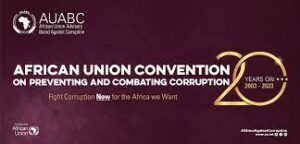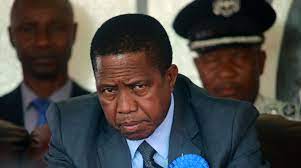Claver Mutinta*
Lusaka, Zambia— Like many other nations, Zambia—as part of the global village—is signatory to international conventions meant to combat and curb corruption.
It is a State party to the African Union Convention on Preventing and Combating Corruption (AUCPCC) that was adopted in early July 2003 and whose 20th anniversary is slated for Mozambique.
AU Convention against corruption
At the adoption of the convention those two decades ago, African leaders expressed the concern that corruption and impunity were bearing negatively on political, economic, social and cultural stability on the continent and its peoples.
The leaders noted that graft tended to undermine accountability and transparency in the public sector and was largely to blame for stunted growth and development.
The convention encourages State parties to partner in protecting societies against corruption and to adopt local and trans-border mechanisms to curb the malaise.
One of the major highlights of the convention is fighting corruption through the forfeiture of assets and other gains suspected to have been acquired through corruption and the proceeds of crime.
Article 16 (1) (a) of the convention encourages each State party to adopt legislative measures to enable its authorities to search, identify, trace, administer and freeze or seize the proceeds of corruption pending the finalisation of prosecution or investigations.
Article (1) (b) encourages confiscation of proceeds or assets or money—or their equivalent–derived from offences established in accordance with the convention.
The convention is administered by the African Union Advisory Board against Corruption (AUABC), an agency of the African Union. 
In line with the AU convention on preventing and combating corruption, the Zambian government has domesticated Article 15 of this convention, and enshrined it in the statutes, particularly the Anti-Corruption Commission Act (2010).
This article relates to the extradition of persons facing prosecution for corruption and related crimes among State parties.
No sacred cows
President Hakainde Hichilema has repeatedly indicated that there will be no sacred cows in the fight against corruption.
So far, the president is widely considered to be walking the talk as he fired a number of senior government officials allegedly involved in illegal mining of the sugilite mineral without necessary documentation.
Among the dismissed officials are Luapula provincial minister, Derricky Chilunduka, the deputy permanent secretary, Royd Mwansa, regional police chief, Gloria Mulele, and district commissioners.
The majority of the suspects or alleged offenders facing corruption charges are those who served in the past administrations that include that of the then Edgar Lungu-led Patriotic Front, and close family members.

Last year, law enforcement agencies forfeited to the State, US$57,000 and over K65 million (more than US$3.8 million), together with several properties, from a female journalist with close links to the top leadership.
The journalist has not been prosecuted because, according to sections 27 and 28 of the Anti-Corruption Act, she made full disclosure of properties suspected to be proceeds of crime.
The Zambian government has since set aside the money for school bursaries and free education for pupils in grades one and 12.
Former first lady, Esther Lungu, is on the verge of losing her 15 double-storey flats valued at over K41.5 million (or at least US$2.3 million) to the State on suspicion that they are proceeds of crime.
The State has approached the Economic and Financial Crimes Court to have tainted properties belonging to family members of former president, Edgar Lungu, forfeited.
It has also applied for the forfeiture of properties that include a farm, poultry, a three-storey lodge and several flats belonging to the Lungu children, Tasila and Chiyeso.
Our assets first
The director of public prosecutions (DPP), Gilbert Phiri, is already seeking a non-conviction based forfeiture order for property believed to have been ill-gotten, in line with Order 30 of the High Court Rules, read together with sections 29 and 31 of the Forfeiture of Proceeds of Crime Act of 2010.
This implies that the former first lady might be forced to surrender the properties in question without being subjected to a trial.
On the other hand, the ACC has seized or restricted properties valued at over K477 million ( US$26.5 million) belonging to 18 senior Finance and National Planning ministry officials in connection with active court cases and matters under investigations.
The officials include the auditor general, Dick Sichembe, and the accountant general, Kennedy Musonda.
They allegedly paid themselves allowances on fictitious activities between 2020 and 2021.
This reportedly led to the Zambian government losing more than K300 million (US$16.6 million).
These officers had close links with the previous administration.
The Anti-Corruption Commission (ACC) has also restricted treasury bonds and bills held by the Finance and National Planning officials.
Some of the officials have offered to pay back the money at the behest of the ACC.
Many other senior officials of the former ruling party, the Patriotic Front, and government are facing corruption charges in courts of law.
The former secretary general of the Patriotic Front, Davies Mwila is in court in connection with alleged improper possession of over K102 million (US$5.6 million) while former Defence ministry permanent secretary, Stardy Mwale, faces allegations of fraudulently facilitating US$50 million payments to a company, ELBIT Systems Limited, for goods and services not supplied or rendered in full.
The facilitated payment was for purported medical evacuation services on the Gulfstream G650-ER jet and its upgrade from a single mission passenger business jet to a mount mission aircraft.
Pies in the skies
In June this year, Zambian law enforcers retrieved from Zimbabwe, the Bell 206 jet range helicopter which was seized from former Foreign Affairs minister, Joseph Malanji.
The aircraft was bought for US$700,000 and the purchase is believed to have been criminally conducted.
Recently, the DPP announced that the Zambian government was gunning to retrieve and forfeit from South Africa, a luxurious helicopter purchase at US$1.4 million because it is believed to have been corruptly bought.
The helicopters worth about R38 million were bought in 2021 after the former Foreign Affairs minister allegedly laundered US$5 million in Zambian state funds earmarked for the purchase of a property for the Zambian embassy in Ankara, Turkey.
This case involving the chopper is still pending.
Zambia has in place an inter-agency coordination framework aimed at fighting corruption and illicit financial flows.
This framework gave birth to the national task force on asset recovery.
The minister of Justice, Mulambo Haimbe, recently said the inter-agency coordination model is meant to mitigate economic and financial crimes.
“The President [Hakainde Hichilema] called for the establishment of effective stolen asset recovery mechanisms,” he said.
“And in response to that call, the National Prosecutions Authority, with the assistance of various law enforcement and other relevant agencies, drew up a framework for the inter-agency coordination.”
Early this year, the US government gave Zambia US$16 million to enhance its fight against graft.
*Claver Mutinta is a Zambian journalist and a member of the Network of African Media Practitioners against Corruption (NAMPAC)


Comments are closed.